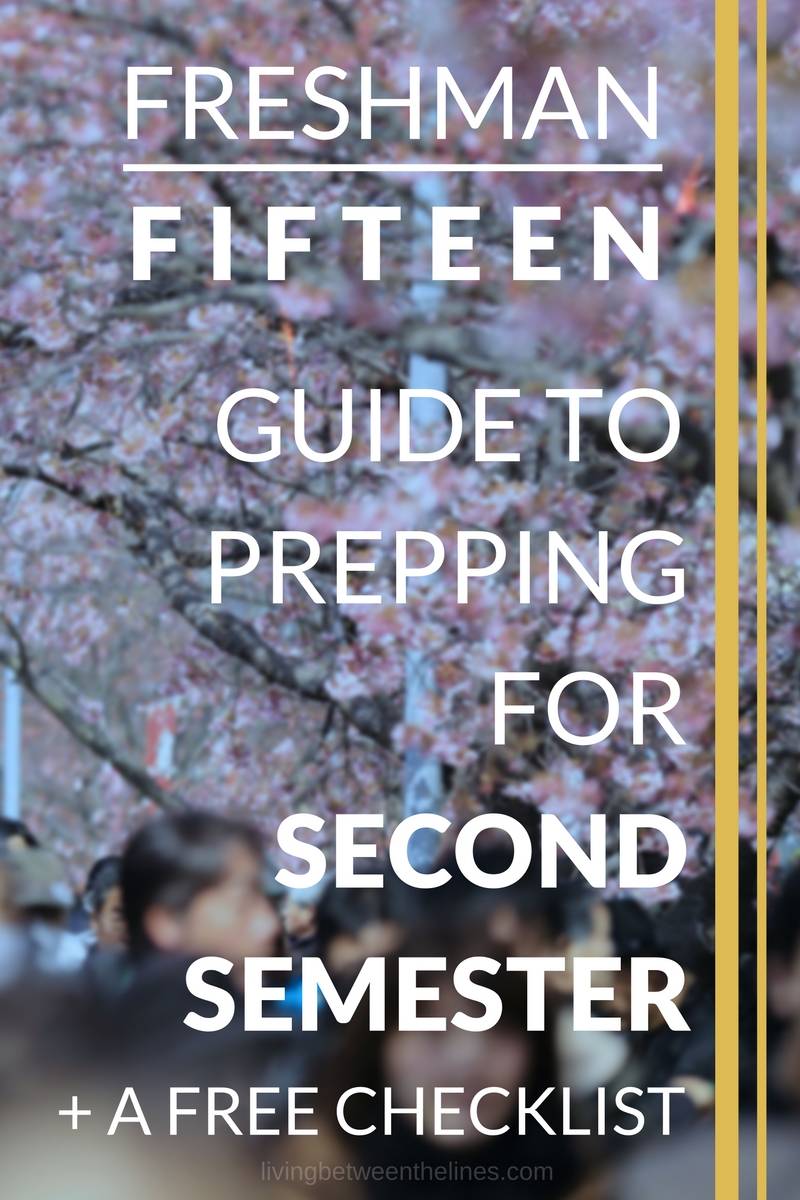Congrats, kid, you’ve made it through a semester of college! While getting halfway there might not seem important, this is a big transition point. You’re out of your first batch of classes and into the next, hopefully with some fresh perspective on your studies and your future.
As good as relaxing sounds, it’s important to stay on top of your game. Your return to campus will be busy for plenty of reasons – moving back in, reconnecting with people, figuring out your new class schedule, and the like. But fear not! You can stay on track without losing your mind if you just prioritize your tasks.
This post is the seventh in a series I’m calling “Freshman Fifteen” – a set of fifteen posts that will walk you up to and into your freshman year of college. Read up on the first post here, or just dive in:
Prepping for Second Semester

Reading a blog post with a bunch of ideas is all well and good, but when it comes down to actually doing stuff, nothing beats old fashioned paper checklists. With that in mind, I've whipped up a checklist with every to-do in this post, as well as some wiggle room to add tasks of your own. Post it somewhere visible these next few weeks to keep yourself accountable.
Keep an eye on your email - as soon as you confirm your subscription, I'll send along the password!
High Priority
These are the things you should be doing right off the bat. I know you’ve just gotten back to campus, it’s cold as the ninth circle out there, and the sun goes down at 4:30, but some things just have to be done.
Schedule an advising appointment. I’m not entirely certain that it’s possible to schedule “too many” advising appointments. As long as you’re eating, sleeping, getting to class on time, and socializing with some regularity, schedule as many as you want. But definitely at least one, to make sure you’re on the right track.
Figure out your schedule for the semester. If you’re working, make sure your shifts won’t overlap with classes. Ensure that you know where each of your classes are located. Did you just realize that you’re going to have to get a mile and a half across campus in ten minutes? Time to email your professors and see about leaving early or arriving late.
Get those syllabi under control. You know how your high school teachers told you that your professors would never remind you about homework, and you’d only know about it from the syllabus? I’ve never actually been in a class like that. But don’t underestimate the importance of the syllabus. If you’re not making a complete assignment list, at least make sure none of your pre-scheduled events line up, and prepare in advance for weeks from hell. I’ve got a whole post on using your syllabus right, if you want more guidance.

Update your resume. No matter when you start applying for your summer work, you’ll want to have your first semester accomplishments added to your resume sooner rather than later. Your campus likely has a writing center or career office that will be happy to help you revamp. Purge high-school-level filler and focus on your skills, talents, and education as best you can.
Start the job/internship search (if you’re in a big city or highly competitive major). I don’t have a lot of experience with this level of demand, but I know a lot of Chicago kids and Computer Science majors who want to have their summer work plans on lock by mid-February. It seems like larger metropolises and some majors really favor this timeline. Not sure if your major applies? That sounds like a question for your upcoming advisory appointment.
Mid-Priority
These are things you should get around to. If they’re not done by the time you get back to campus, no big deal, but make sure you look at them within the first few weeks of the semester.
Clear out. If you’re anything like me, you have approximately one million old handouts from last semester lying around your dorm. It’s not a bad idea to hang on to old papers or notes, in case you can help a friend or need to deal with some administrative issues, but it is a bad idea to just leave them out. Find a safe, out-of-the-way place to file them in some semblance of order and you’ll be good.
Join more clubs. If you haven’t gotten involved on campus, now is a good time to start. Maybe you took last semester to settle in and focus on academics, which is understandable. Or maybe you didn’t find an organization that was right for you, which totally happens. But, assuming you’ve got the time, finding a new club is a great way to keep yourself energized and dedicated for your second semester.
Career fairs. Career fairs as a freshman might seem a little forward, but let’s be real – you know you’re not about to get hired. What you are about to do is get tons of experience pitching yourself and your skills. You might even meet a recruiter who remembers you next year… And the year after that… And the year after that, when they finally do hire you. Get comfortable in the business side of your future career as early as you can.
Start the job/internship search (for everyone else). For most people, the first half of the semester is when you should be looking for your summer plans. Now, not everyone has to have a job or internship, but if that’s something you’re interested in, get to looking. Your advisor and faculty will probably have some good resources, as will any local postings for the area you’d like to work in.
Do it when you’ve got some spare time.
I’m not saying these tasks are unimportant, I’m just saying that if you wait until the second few weeks of the semester – maybe even midterm, for a few of them – you’ll still be on track. Look for opportunities to do these things as they arise.
Update LinkedIn. I waited forever to start using LinkedIn and that was a mistake. I missed the chance to network with a lot of really cool people who I’d love to reconnect with… But I’d feel weird contacting them out of the blue. Don’t make my mistake. While it might feel like the most boring kind of social media, it’s also among the most rewarding. (Also, seeing who views your profile is super fun.)
Start decluttering. Sure, this is your space now, but it’s very likely that, come spring, you’ll be moving out and into someplace different next fall. Get a jump on your spring cleaning/packing woes by clearing out some junk now. All those “packing for college” lists tend to be a little too comprehensive. So if you haven’t used it yet this year and can’t see yourself using it in the future, either give it away or throw it out.
Review best/worst practices. Take some time to sit and think about last semester. Was there anything that worked out really well for you? Anything that kind of sucked? In the moment, it’s hard to notice that a particular study process or new idea is really working out, because you’re so excited to be doing well. In retrospect, you’ll be better able to see your strengths and weaknesses.
Plan something incredible. Spring semester is weird. While you’ve got spring break in there somewhere, it can feel like a real death march sometimes. To keep yourself feeling passionate and excited, consider planning something to look forward to. Whether it’s a weekend in the nearest big city with friends or hosting a fancy dinner party, find something that makes your heart flutter and plan it when you know you’ll need it. You’ll always have motivation, and future-you will have a great time.

Seem like a lot?
It kind of is, especially if you’re just getting back to campus and trying to settle back in to college life. Luckily, I pulled together a checklist for you to use to keep track. It includes space for due dates and an extra line in each priority category, in case there’s something specific to your life, college, or major that needs to be taken care of.
As usual, the checklist is available now in the Resource Library. If you’ve already subscribed, check your latest newsletter to be reminded of the password. If you’re new here, sign up below for Resource Library access.
Read the next Freshman Fifteen post – Acing Your Advising Appointment >>


